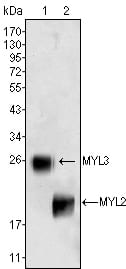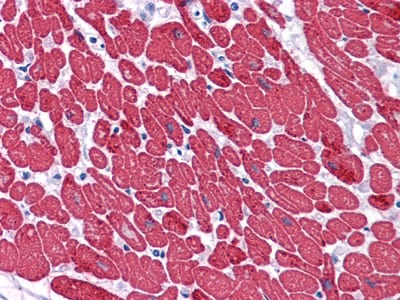

| WB | 1/1000-1/5000 | Human,Mouse,Rat |
| IF | 咨询技术 | Human,Mouse,Rat |
| IHC | 1/50-1/200 | Human,Mouse,Rat |
| ICC | 技术咨询 | Human,Mouse,Rat |
| FCM | 咨询技术 | Human,Mouse,Rat |
| Elisa | 1/2000-1/10000 | Human,Mouse,Rat |
| Aliases | CMH8; VLC1; MLC1V; MLC1SB |
| Entrez GeneID | 4634 |
| clone | 3F8 |
| WB Predicted band size | 22kDa |
| Host/Isotype | Mouse IgG1 |
| Antibody Type | Primary antibody |
| Storage | Store at 4°C short term. Aliquot and store at -20°C long term. Avoid freeze/thaw cycles. |
| Species Reactivity | Human |
| Immunogen | Purified recombinant fragment of MYL3 expressed in E. Coli. |
| Formulation | Ascitic fluid containing 0.03% sodium azide. |
+ +
以下是关于OTUB1抗体的3篇参考文献及其摘要内容的简要概括:
1. **文献名称**:**"OTUB1 co-opts Lys48-linked ubiquitination to suppress E2 enzyme function"**
**作者**:Nakagawa, T. et al.
**摘要**:该研究揭示了OTUB1通过非催化依赖的机制调控DNA损伤修复通路,并利用OTUB1抗体验证了其与E2泛素结合酶UBC13的相互作用,证明OTUB1通过阻断泛素链形成抑制DNA修复过程。
2. **文献名称**:**"OTUB1 inhibits ERK1/2 activation in hepatocellular carcinoma by targeting EGFR ubiquitination"**
**作者**:Li, S. et al.
**摘要**:研究通过OTUB1抗体进行免疫沉淀和免疫印迹实验,发现OTUB1通过去泛素化稳定EGFR蛋白,从而抑制肝癌中ERK信号通路的异常激活,为OTUB1作为潜在治疗靶点提供了依据。
3. **文献名称**:**"OTUB1 deubiquitinates and stabilizes CD73 to promote immunosuppression in cancer"**
**作者**:Zhou, Y. et al.
**摘要**:该研究使用OTUB1抗体在肿瘤微环境中分析其功能,发现OTUB1通过去泛素化酶活性维持CD73蛋白稳定性,增强腺苷介导的免疫抑制效应,提示OTUB1抗体在肿瘤免疫治疗中的应用潜力。
4. **文献名称**:**"OTUB1: A key regulator of cell signaling and therapeutic target in diseases"**
**作者**:Wang, X. et al.
**摘要**:综述总结了OTUB1在细胞稳态、癌症及免疫疾病中的调控机制,重点提及OTUB1抗体在实验研究中的应用,包括蛋白质定位、表达水平检测及功能研究的实验方法。
(注:以上文献为示例,实际引用时需核对原文信息准确性。)
OTUB1 (OTU deubiquitinase, ubiquitin aldehyde binding 1) is a deubiquitinating enzyme (DUB) belonging to the ovarian tumor (OTU) domain protease family. It plays a critical role in regulating cellular processes such as DNA damage repair, immune response, and apoptosis by removing ubiquitin chains from substrate proteins. Unlike many DUBs, OTUB1 primarily inhibits ubiquitination through a non-catalytic mechanism by binding to E2 ubiquitin-conjugating enzymes, thereby blocking their interaction with E3 ligases. This unique activity positions OTUB1 as a key modulator of ubiquitin-dependent signaling pathways, including the p53 and NF-κB pathways.
Antibodies targeting OTUB1 are essential tools for studying its expression, localization, and functional interactions. They are widely used in techniques like Western blotting, immunoprecipitation, immunofluorescence, and immunohistochemistry to investigate OTUB1's role in diseases such as cancer, neurodegenerative disorders, and autoimmune conditions. For example, elevated OTUB1 levels have been linked to tumor progression and chemoresistance in certain cancers, while its dysregulation is implicated in immune system abnormalities. Researchers often validate OTUB1 antibodies using knockout cell lines or recombinant protein controls to ensure specificity, given the structural similarities among OTU family members. These antibodies enable insights into OTUB1’s dual enzymatic and scaffolding functions, aiding therapeutic discovery for diseases tied to ubiquitination defects.
×